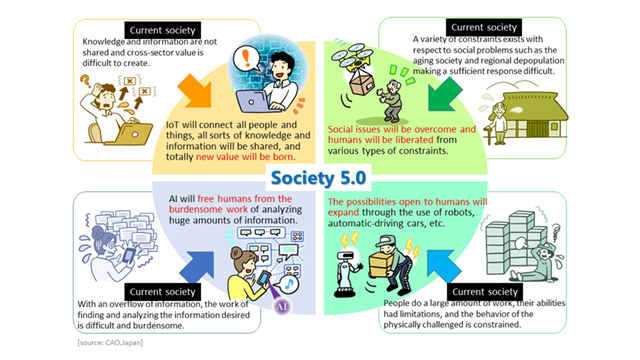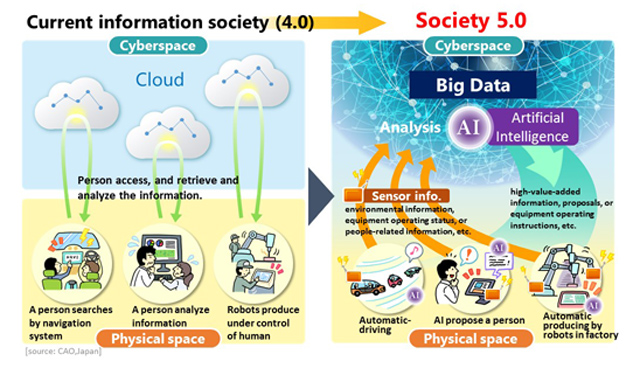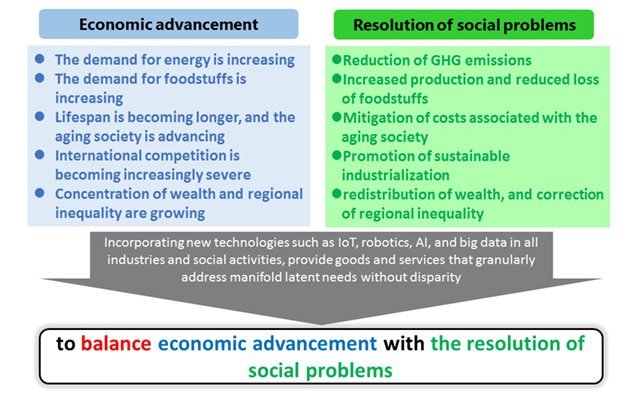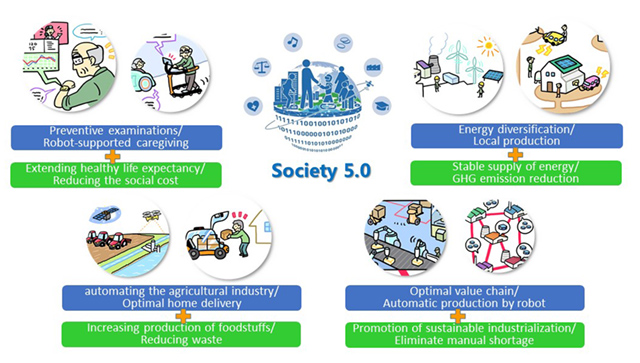Critique of Japanese govenment's developing concept of "Society 5.0"
Why unhealthy anomary
of it?

Critique of Japanese govenment's developing concept of "Society 5.0"
Why unhealthy anomary
of it?

Japanese government says, "One definition [of Society 5.0]: "A human-centered society that balances economic advancement with the resolution of social problems by a system that highly integrates cyberspace and physical space.""
"Society 5.0 was proposed in the 5th Science and Technology Basic Plan as a future society that Japan should aspire to. It follows the hunting society (Society 1.0), agricultural society (Society 2.0), industrial society (Society 3.0), and information society (Society 4.0)./ In the information society (Society 4.0), cross-sectional sharing of knowledge and information was not enough, and cooperation was difficult./ Because there is a limit to what people can do, the task of finding the necessary information from overflowing information and analyzing it was a burden, and the labor and scope of action were restricted due to age and varying degrees of ability. Also, due to various restrictions on issues such as a decreasing birthrate and aging population and local depopulation, it was difficult to respond adequately./ Social reform (innovation) in Society 5.0 will achieve a forward-looking society that breaks down the existing sense of stagnation, a society whose members have mutual respect for each other, transcending the generations, and a society in which each and every person can lead an active and enjoyable life." - Society 5.0, by Japanese Cabinet Office.
| Source: https://www8.cao.go.jp/cstp/english/society5_0/index.html |
Presuppositions of images that will be criticized by Kasuga and Ikeda |
 |
|
 |
|
 |
|
 |
Mr. Sho Kasuga and Mitsuho Ikeda wrote monumental paper, entitles as "The recipe for the wisdom and mindful society: Over the Japanese myth of technological innovation" of the critique of the official Japanese policy on Science and Techonology including not only in Society 5.0 but also in history over one hundred fifty years' Japan.
"Since early 1990s
Japanese Research and Developments (R&Ds) scenes gradually have
been
losing global competitiveness and many thought that they were in the
cul-de-sac of “catch-up and
pass” model. Japanese government had tried to transform their role in
international societies from
catch-up challenger to one of the global leaders. The scientific
R&Ds and higher education policies were defined as key factors to
promote creativity and keep global competitiveness of the society by
the government. The Basic Act on Science and Technology, Act No.130 of
November 15,
1995, “Kagaku-Gijyutsu-Kihon-Hou,” and many other means are implemented
in mainly national
universities and public research institutions. The outcomes of this
policy change have not been
sufficient at least in the aspect of the economic success. Till now
there are many inconsistencies
between the policy and social structure of Japan. In new policy,
Japanese government recommended freelance professionals model of work,
however, people have recognized that large enterprises
are providing good welfare and freelance workers have big disadvantage
under the semi-neo-liberal economic policy of the government. In
Japanese society, the private big enterprises are strong
and influential, and the small entrepreneurs and the other forms of
intermediate organizations, e.g.
NPO/NGO, are relatively weak. Many of innovations can be driven by
ethics or human values because human values define what we need to
solve economic dilemma of R&D. And human values
are dealt by non-profit intermediate organizations locally or globally
in general. Lack of strong
non-profit organizations like global NGOs, professional associations,
glass-roots religious bodies,
and many other social groups, can induce series of weak points not to
make Japanese society more
innovative than before. We conclude that it needs to redefine the
social value we will pursue and to
build intermediate organizations between university and civil society"
Links
++